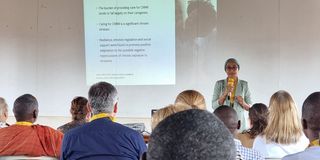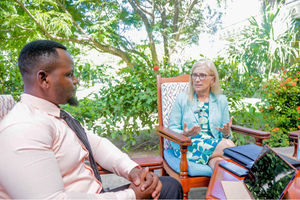Prime
Nadia’s quest to reduce the gap in mental health care in Tanzania

What you need to know:
- Nadia Ahmed, a clinical psychologist and the founder of Mind Matters Counselling and Human Development, embarked on such a journey early in her life.
Choosing a career path can be unpredictable at times. Sometimes it takes a series of personal challenges to set one on a path of professional discovery, aimed not only at understanding a particular challenge but also at helping others facing similar struggles.
Nadia Ahmed, a clinical psychologist and the founder of Mind Matters Counselling and Human Development, embarked on such a journey early in her life.
Her introduction to the world of mental health came at a young age when she witnessed the toll it took on her paternal grandmother.
“I was a young girl who did not fully understand the concept of mental health back then. However, this illness not only prevented me from truly getting to know my grandmother as a person but also kept her from getting to know me,” she recalls.
Her parents would visit her grandmother at Muhimbili National Hospital, leaving Nadia and her brother at home because it was deemed unsuitable for children.
Her brother’s pursuit of psychology studies inadvertently sparked Nadia’s interest in the field. She would leaf through his psychology notes, unknowingly laying the foundation for her own future in psychology.
“My brother would leave his notes and books around the house and my curious self would pick them and briefly let my eyes wander through them,” she recalls.
Her grandmother’s illness, coupled with growing up in a large family, occasionally living with relatives, triggered behavioural outbursts due to jealousy. This prompted Nadia to explore these outbursts and understand people’s behaviours, further deepening her interest in psychology during her high school years.
Her passion for psychology continued to grow during her Bachelor’s Degree in Psychology at Eduvos in Pretoria, South Africa. It was during this time that she had her first sessions with patients. Nadia realised the profound impact she could make by helping people navigate their emotional and mental struggles.
Her clients would come in with specific problems, have conversations with her, and leave feeling lighter and better, having released the burdens that troubled them.
Nadia vividly recalls her first clients, many of whom were victims of violence and sexual assault, including refugees who had endured significant trauma. Guiding them through their healing process brought her immense satisfaction and served as validation that she had chosen the right path.
“There’s no better feeling than helping someone get past something that has wounded them emotionally and mentally. It’s like getting a chance to see them in a whole different light. Some of these clients would confess; ‘You are the first person I have talked to; that was helpful,’- and such reactions made me believe I had chosen the right path for myself and others,” she shares.
There’s a Swahili saying, ‘Mganga hajiganji,’ which means a doctor does not treat themselves. As Nadia began practising psychology, she initially neglected her own mental health needs, which is a common pitfall for psychologists.
She experienced secondary trauma and compassion fatigue during her first year of practice. She felt isolated as she was far from home and struggled to afford therapy, which was costly in South Africa. Juggling a heavy caseload and trying to continue without therapy took its toll.
“I was not paid enough money to cover therapy because, aside from being a life necessity, therapy in South Africa was expensive. I was seeing between five and six clients a day, five days a week. A part of me thought I could continue practising without seeing a therapist,” she shares.
It wasn’t until Nadia budgeted her income that she realised the importance of weekly therapy sessions. Despite facing such challenges, Nadia’s commitment to her mission never wavered. She declined a job offer in South Africa, choosing instead to return to Tanzania to address the shortage of psychologists in her home country.
“If I had accepted the offer, I would not have fulfilled the objective that led me to study psychology, which is to reduce the shortage of psychologists in Tanzania,” she says.
Upon her return, she encountered challenges finding employment as a psychologist in Tanzanian hospitals. Many hospitals didn’t employ psychologists, and those that did already had staff in place.
Her determination led her to Mukti, a yoga and wellness centre in Dar es Salaam, where she volunteered. There, she discovered the therapeutic benefits of yoga, and she began to integrate yoga postures and psychology principles, recognising a demand for this holistic approach.
Her clients were interested to know what she did and where she conducted her business, which is what inspired Nadia to establish her own organisation.
In August 2017, Nadia officially established Mind Matters and rented space at the wellness centre, bringing her holistic approach to life. A year later, she became a lecturer at Hubert Kairuki Memorial University, where she taught psychiatry, medical psychology, behavioural science, and therapeutic counseling. Her passion for creating more psychologists in Tanzania is what made her turn to teaching.
She also needed to find a space where her clients would feel safe enough to open up. “I had to do something within the line of my passion so I could afford this space.”
All of Nadia’s clients undergo medication therapy before psychological sessions. “For a problem to be fully addressed, it must be tackled at its roots,” she emphasises. She recalls an incident where she had to turn away a client who wasn’t compliant with their medication, recognising that therapy couldn’t be effective if the client wasn’t fully committed.
In late 2020, Nadia sought to understand the landscape of mental health in Tanzania more comprehensively. She joined Muhimbili University of Health and Allied Sciences (MUHAS) as a Clinical Psychology Resident, aiming to gain insights that would enhance her clinic’s capacity to serve Tanzanian society from a broader perspective. Her journey was not without its challenges, as she faced difficult situations, including negative reactions from clients.
“I have been spat on, cursed, and many other things,” she recalls.
Through Mind Matters, Nadia has learned and grown, expanding her clinic and building a team consisting of one psychiatrist and two psychologists. She emphasises the importance of “bracketing,” a skill that allows mental health professionals to separate their own emotions from those of their clients, ensuring that their work remains empathetic and effective.
“A therapist is also a human being who may be going through similar struggles, both directly and indirectly. Outside of work, I keep myself healthy, both mentally and physically. I lead my social life healthily so that I can appear in the best state of mind and body to help my clients get through their issues,” she says.
Nadia is committed to reducing the gap in mental health support in Tanzania. “The number of psychologists in Tanzania is not as high as needed to serve the large population that requires our assistance. Just as Tanzania needs doctors for physical health, we also need more professionals to address mental health concerns in the country,” she observes.
Nadia’s dedication to improving the mental well-being of Tanzanians is an inspiring journey of transformation and hope.



